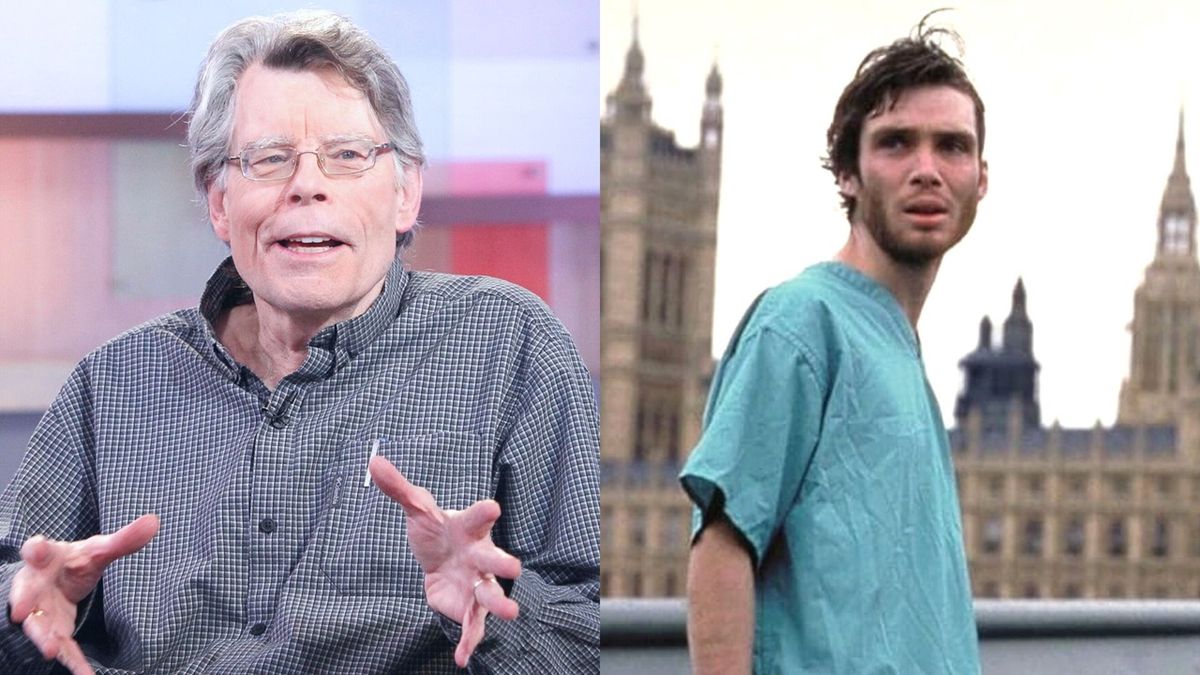That recent 28 Days Later good news which revealed that not only were Danny Boyle and Alex Garland reteaming to make 28 Years Later but that the horror sequel officially found a studio home and roped in original lead Cillian Murphy to produce and potentially star should please all zombie-movie fans. However, there’s one famous fan who is likely extra excited: Stephen King.
Yes, the iconic horror author behind classic scary titles like Carrie, Cujo, The Shining and Salem’s Lot — all of which were turned into film adaptations, with the latter upcoming movie set to star Lewis Pullman, Makenzie Leigh and Alfre Woodard — is reportedly a big fan of the Danny Boyle-directed flick. So much so, in fact, that the writer allegedly bought out 800 movie tickets when the post-apocalyptic film hit theaters in November 2002.
But exactly why did the author do that? Here’s the full story behind Stephen King buying all those 28 Days Later tickets.
Why Stephen King Bought Hundreds Of 28 Days Later Tickets
According to a recent Inverse oral history on the “genre-redefining” zombie flick —which stars Murphy as a bile courier who awakens from a coma to discover that a highly contagious “rage virus” has been accidentally unleashed on society, turning everyday Brits into freakishly fast and strong zombies — Stephen King was an early supporter of the movie, despite initially middling reviews from critics. Film producer Andrew Macdonald told the outlet:
When the film actually got released, I remember, classic British media, most of them in the reviews were pretty awful. Because it was a genre movie, they dismissed it. It got really good reviews in America…Stephen King loved it. He bought 800 tickets on the opening night or something. And it made almost $50 million in America.
Of course, King is one of the world’s foremost horror fans, so it’s not a shock that he would champion a freaky film like 28 Days Later. And he’s a noted zombie fan, as evidenced by his 2006 novel Cell, which featured a mysterious cell network signal that turned average citizens into vicious, zombie-like creatures.
However, the author may also have been drawn to Boyle’s film for its character-driven drama, which set it apart from other jump-scare-loaded genre titles. As King proclaimed during the 2011 TCM special, A Night at the Movies: The Horrors of Stephen King:
Horror movies often work better when we have a stake in the game. The more we care about the characters, the more human they are to us, the more appealing they are to us and the more effective the horror tends to be.
Clearly, he loves a high-stakes story. Along with Cillian Murphy, Naomie Harris, Christopher Eccleston, Megan Burns and Brendan Gleeson brought exactly that.
How Did 28 Days Later Change The Zombie Movie Genre?
Grossing more than $82.7 million worldwide on a budget of just $8 million, 28 Days Later would clearly bounce back from those initial poor reviews to become one of the standout horror titles of the past two decades. It would spawn a 2007 sequel, 28 Weeks Later, starring Robert Carlyle, Rose Byrne, Jeremy Renner and Idris Elba, and, as mentioned, that upcoming 28 Years Later follow-up.
The film series’ brand of fast-moving zombies mixed with gritty realism and character-driven storytelling revitalized the zombie apocalypse subgenre. It also reinvented it, ushering in an undead renaissance with movies like the Dawn of the Dead remake, its spoof Shaun of the Dead, Zombieland, World War Z and more.
If you don’t want to pull a Stephen King and buy out an entire movie theater to watch Boyle’s original zombie flick, you can stream 28 Days Later with a Sling TV plan.
